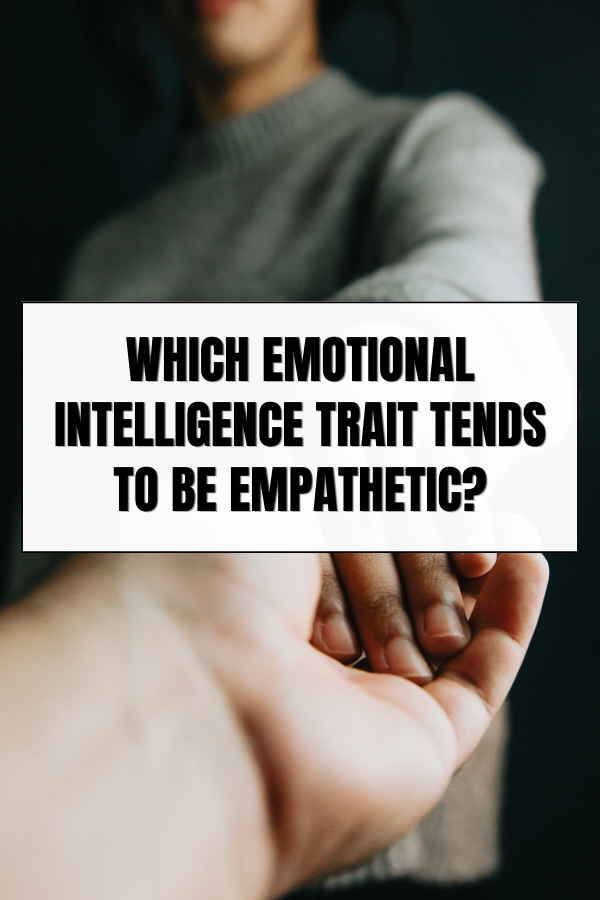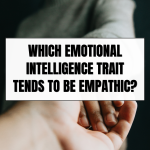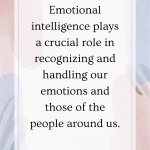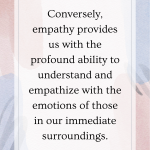If you find the connection between empathy and emotional intelligence intriguing, rest assured, your curiosity is shared by many. While these terms are often used interchangeably, they uniquely illuminate different dimensions of our emotional landscape. And today, we will dive into a mind-boggling question: which emotional intelligence trait tends to be empathetic?

Emotional intelligence plays a crucial role in recognizing and handling our emotions and those of the people around us. Conversely, empathy provides us with the profound ability to understand and empathize with the emotions of those in our immediate surroundings. Let’s explore how these interconnected concepts strengthen our relationships, nurture empathy, and enhance our communication skills. By doing so, you can enjoy a deeper comprehension and connection in your social interactions. Plus, you can practice these self-compassion and self-expression skills for a better understanding of yourself and others.
The Relationship Between Emotional Intelligence And Empathy

Emotional intelligence, often referred to as EQ, involves recognizing, comprehending, and managing one’s emotions, as well as understanding the emotions of others, fostering personal well-being and deeper connections.
Empathy, on the other hand, is centered on understanding and sharing the feelings of others, playing a crucial role in human relationships. While emotional intelligence focuses on emotional management, empathy emphasizes connecting with and showing compassion for others. By exploring empathy, individuals can forge sincere connections, cultivate understanding, and promote empathy and compassion in their interactions.
Empathy and emotional intelligence share a deep connection. Individuals with high emotional intelligence often exhibit empathy by comprehending and sharing others’ feelings. Empathy plays a vital role in social skills, a critical component of emotional intelligence, encompassing effective communication, relationship-building, and conflict resolution.
Those with strong emotional intelligence skillfully manage their emotions, fostering a deeper sense of empathy for others. By acknowledging their own emotions and their impact on others, they become more sensitive to the emotions of those around them.
While not innate for everyone, empathy is a skill that can be honed over time. By honing empathy, individuals can enhance their emotional intelligence, leading to more profound and authentic connections with others.
Mapping Your Future: Exploring Life Areas for Goal Setting
Which Emotional Intelligence Trait Tends To Be Empathetic?
Empathy

Want to know which emotional intelligence trait tends to be empathetic? Of all the emotional intelligence traits, empathy is of course the main answer. This area aims to empathize and understand others’ perspectives.
By embodying empathy, leaders can facilitate the growth of their team members, debunk stereotypes, give constructive feedback wisely, and offer responsive support during challenging times.
Embracing empathy, a key trait of emotional intelligence fosters a positive work environment characterized by team loyalty and mutual respect.
Self-Awareness

On the other hand, being self-aware is another empathic trait. It involves grasping how your emotions influence those around you and acknowledging your ego, strengths, and weaknesses. This empathic quality empowers you to utilize these personal characteristics effectively.
As a result, it can enrich not only your interactions with others but also benefit the collective environment or community you are a part of.
On top of this, there are three more sub-categories of emotional intelligence:
Self-Regulation

Imagine yourself as someone who balances firmness with empathy in their interactions, maintaining emotional control while upholding integrity. Your sense of accountability establishes an ethical benchmark, offering reassurance and motivation to those around you.
By embodying ethical standards and consistently practicing self-regulation, a trait associated with empathy in emotional intelligence, you cultivate an environment characterized by integrity and ethical conduct.
How To Be More Sociable In An Ever-Changing World
Motivation

Motivation stems from understanding your goals and reasons, a trait associated with emotional intelligence. Empathetic people, guided by strong emotional intelligence, set high standards for themselves and consistently work towards their goals.
They motivate and inspire their team by understanding their motivations and encouraging them to excel based on their unique driving factors.
Soft Skills

Masterful in both challenging and positive interactions, people with strong soft skills inspire growth potential. Proficient in conflict resolution and change management, they handle situations diplomatically and sensitively.
Individuals high in emotional intelligence prioritize others’ needs, fears, and aspirations, showcasing empathy and understanding.
Using Emotional Intelligence For A Better Tomorrow
In a nutshell, the answer to “which emotional intelligence trait tends to be empathetic?” is actually two things: social awareness and empathy. Social awareness and empathy are key aspects of emotional intelligence, enabling us to respond compassionately and comprehend others’ emotions better. Developing these qualities improves both personal and professional relationships, leading to a more satisfying life. While some may naturally have social awareness and empathy, everyone can nurture these skills through active listening, perspective-taking, mindfulness, and self-reflection. By committing to these practices, we foster deeper connections, enhanced understanding, and a more empathetic way of navigating the complexities of human relationships.
If you’re interested in learning more about empathy and being a more compassionate human being, take the time to read the following:
- Being An Empath During Mercury Retrograde Can Be Tough
- Are You An Empath or Just Too Sensitive?
- 35 Best Brené Brown Quotes On Shame, Courage and Vulnerability
- Emotional Intelligence as a Leader: Unleash Your Full Potential











Leave a Reply